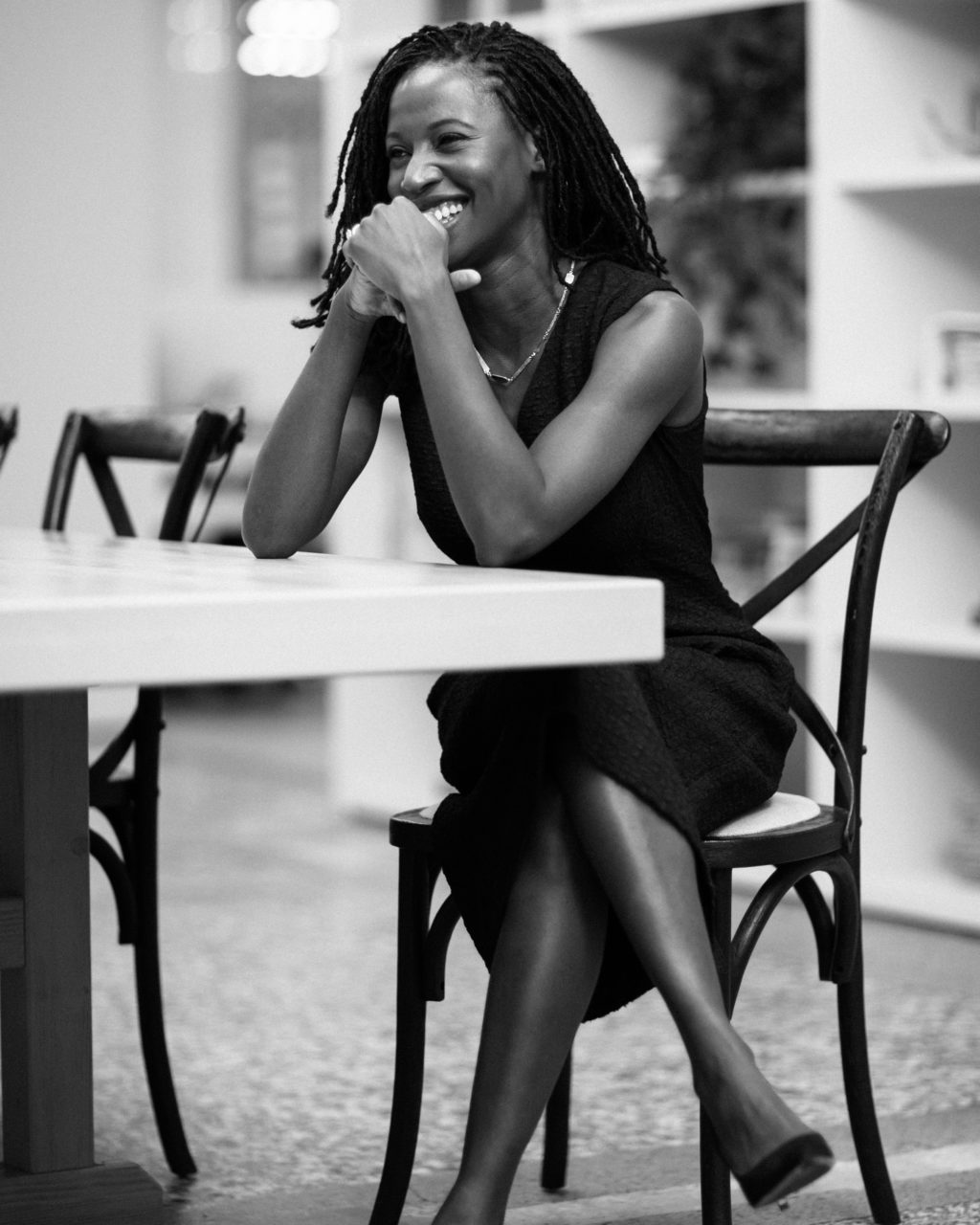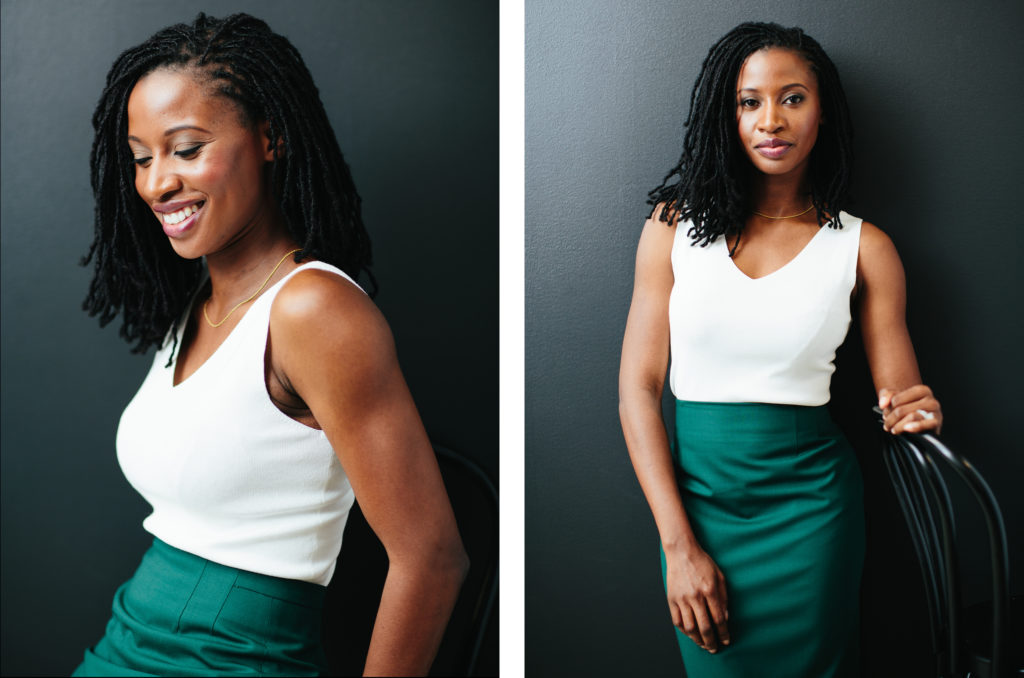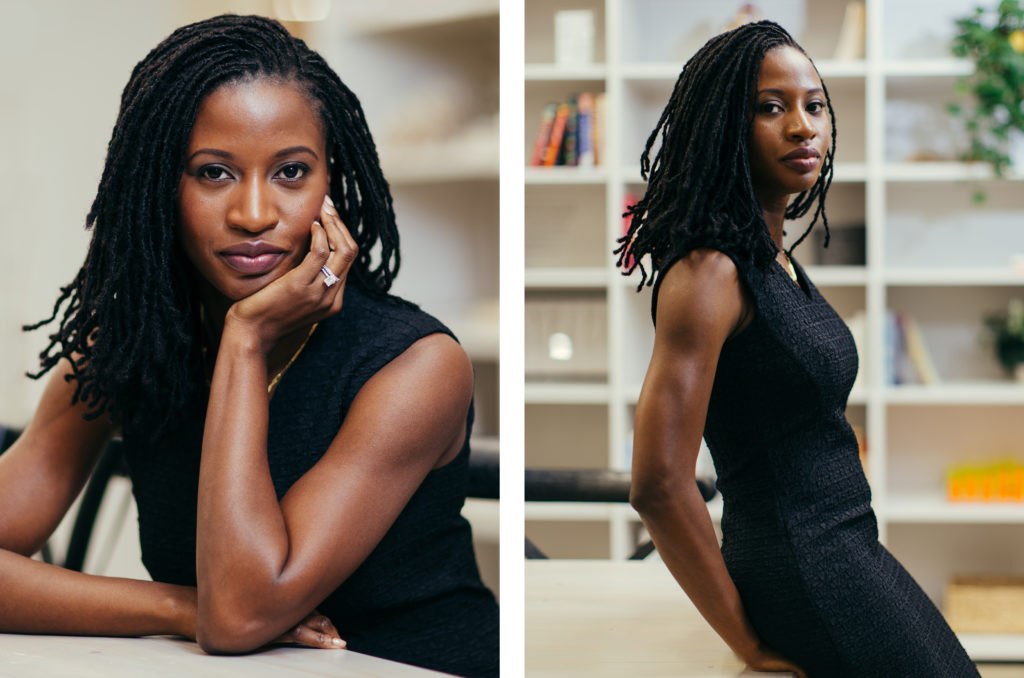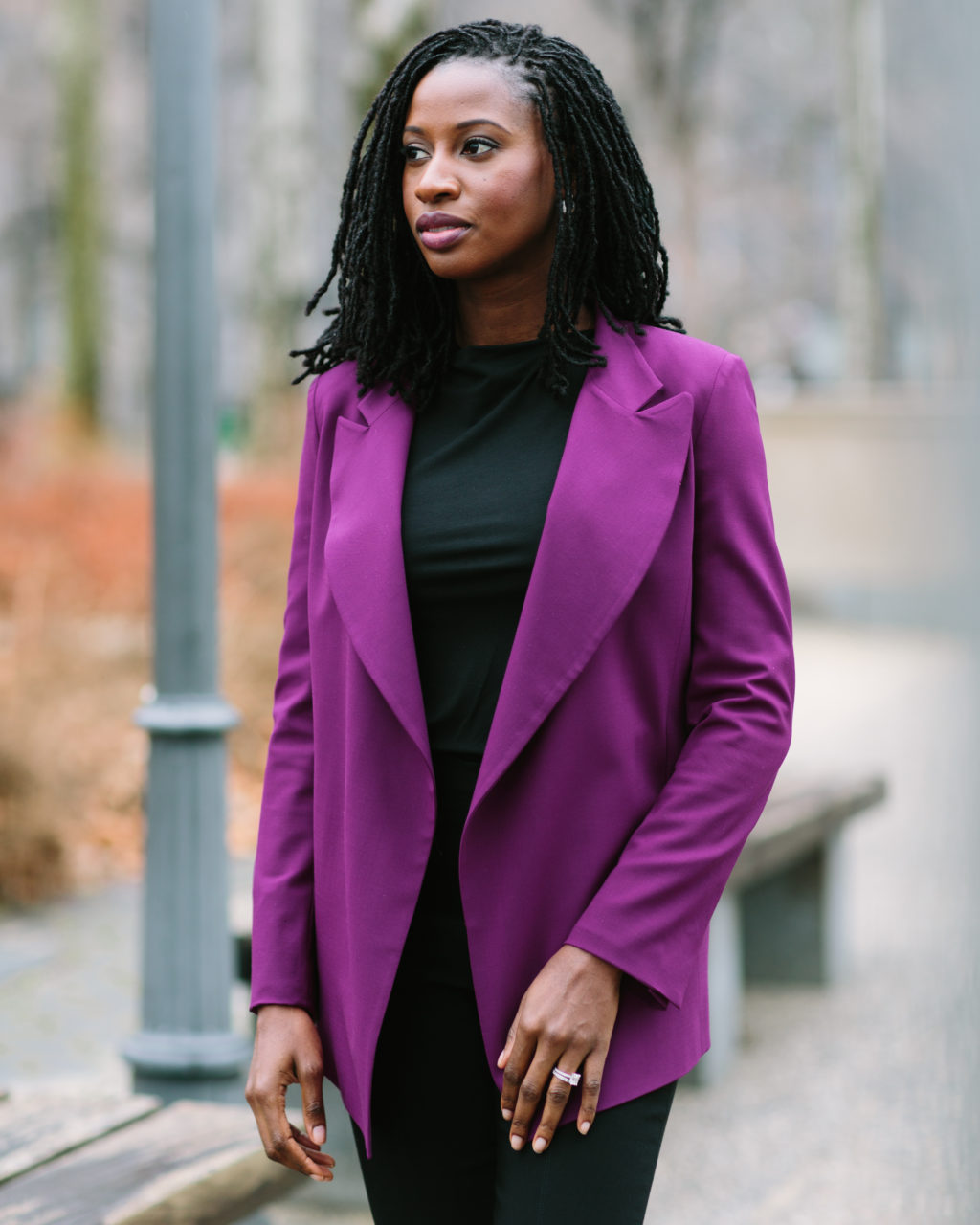Author Wayétu Moore on Founding a Non-profit, Writing a Novel, and Refusing to “Dress the Part”
February 15, 2019 | Filed in: Woman of the Week
When Wayétu Moore was five, her family fled social conflict in Liberia and moved to New York City. She has since written a novel about the history of her birth country, She Would Be King, which came out last fall. Over the years, Moore has pursued acting and screenwriting and she founded a non-profit, One Moore Book, which publishes children’s books featuring characters from cultures that are typically underrepresented in literature and from countries with low literacy rates. In addition, she recently completed a memoir, which is slated for publication in the next year. Here, she talks about wearing many hats, bucking the publishing industry, and refusing to “look like a writer.”

Wayétu wears the Evelyn dress, the Aradia necklace, and the Ginger pump.
I’VE ALWAYS WANTED TO BE A STORYTELLER, whether onstage or in film or in my writing. Clearly, my work has taken many different forms, but my purpose is always the same. The through-line in my writing, non-profit work, and, to some extent, my teaching is a desire to see underrepresented voices gain more prominence in the literary canon.
MY FAMILY LEFT LIBERIA WHEN I WAS FIVE YEARS OLD. I remember the war there very well. It was a complex situation, socially and governmentally. People were being killed indiscriminately, so almost everyone had a reason to flee. I was privileged to have the family resources to do so. My mom was already in the U.S., attending Columbia as a Fulbright scholar, and she paid someone to come and get the rest of the family out. We moved to New York in February 1991 and lived in my mom’s one-bedroom dorm room until she graduated from Columbia. My mom’s colleagues and peers were extremely supportive and made sure our family was comfortable. Some of her classmates studying sociology and psychology were able to give us therapy for the trauma we had just experienced.
WHEN MY MOM FINISHED SCHOOL, we couldn’t go back to Liberia so, when I was eight, we settled in Texas—that’s where I was raised. I moved back to New York City at 17 to study acting at New York University. But after a couple of years, my interest began to shift toward writing and it made no sense to go into more debt there if I wasn’t studying theater. So I transferred to Howard University to complete my undergraduate degree. After graduation, I moved to L.A. to get a master’s in fiction and screenwriting at the University of Southern California. Finally, I returned to New York in 2009.

Wayétu wears the Peggy top, the Cobble Hill skirt, and the Turanna necklace.
I FELT I WAS PIGEONHOLED AS A PERSON FLEEING a war-torn country, and that there was pressure on me to write a memoir about life as an African immigrant who escaped social conflict. What I really wanted to write, though, was speculative fiction that explored Liberia’s history. I was told that that wouldn’t do well with an American audience.
THAT’S WHEN I HAD THE IDEA FOR MY NONPROFIT. Inspired by my frustration with publishing, I founded an organization to create books for children who rarely see themselves in literature or don’t have access to cultures outside of their own. I approached writers and illustrators to contribute and began to do research into anthropology and education. Eventually, I decided that I wanted to go back to school to study these fields and applied to Teacher’s College at Columbia University, where I ended up getting another degree. One Moore Book became a formal non-profit in 2015. Now we have 23 books set in Liberia, New Guinea, and Haiti, as well as an Afro-Brazilian book. We’re working on more cool projects for the coming year.
I WOUND UP WRITING MY NOVEL AFTER ALL, though it took me about 10 years. When I finished the first draft in 2009, it was very long and needed a lot of work. I put it away for four years, then picked it back up to edit it for two more years. I sold it in 2015, and it came out last fall. I had a long relationship with this novel and it was wonderful to finally find an outlet for it, especially since the publishing industry didn’t embrace it early on.

Wayétu wears the Evelyn dress, the Aradia necklace, and the Ginger pump.
ON AN AVERAGE DAY, I wake up and go straight to the office. I just got back from a book tour, which will start up again soon. I’m trying to empower my colleagues so that the organization can run without me. I think the best non-profits aren’t centered around one person.
BOOK TOURS CAN BE WEIRD AT TIMES. It’s the complete opposite of writing, which is so intimate. It’s just between you and the work. Then you have to transition into talking about that process. I find it helps with the awkwardness of talking about myself ad nauseam to think of the tour as just a series of conversations.
SOMEONE ONCE SAID TO ME, “You don’t really look like a writer.” I thought that was telling. Young girls are often taught that you can either be sexy or smart, but not both. I don’t fit into any box, and I try to encourage other people whom I encounter to think that way, too.

Evelyn wears the Octavia top, the Foster pant, the Oliver jacket, and the Capri earrings.
I LOVE MY BODY. I love being a woman, and I love exploring the different layers of my femininity through clothes. I was raised in Texas, so I love heels and low-cut dresses and skin-hugging fits. My style is very Southern in that way. Now, I wear whatever I want, no matter how sexy or revealing it is —or sometimes the opposite. I like variation. I also want to help train the general public, especially young girls, to stop thinking that women should dress a certain way.
THESE DAYS, I GO BACK TO LIBERIA THREE OR FOUR TIMES A YEAR. My nonprofit has a bookstore in Monrovia, which sells our books as well as novels from all around the continent and the world. Also, my grandma lives there. She’s 93. I make an effort to speak to the oldest Liberians that I know, my grandmother included, and ask questions like, “What did your grandmother tell you about what Liberia was like when she was younger?” My parents always did whatever they could to keep us tethered to our culture.
READING HAS BEEN A FORM OF REHABILITATION FOR ME. When I read, I feel safe. I also feel like I understand people a little better. Writing about Liberia’s history in my novel was a way to rediscover a part of myself. Writing the book healed me.
Photographs by Christine Han. Styling by Shanna Engelhardt.





